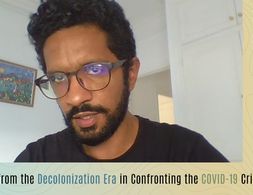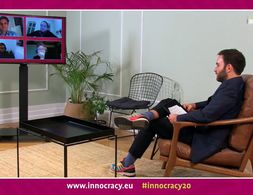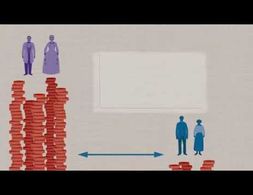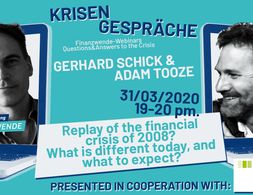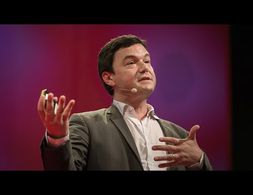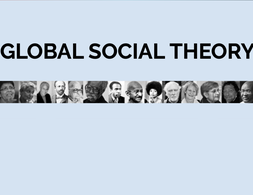✕
343 results
This course provides future change makers in public and private sectors with a comprehensive overview on the structures and actors that shape markets.
In this ambitious and impressive new book, journalist Howard French seeks to excavate the long elided central importance of the African continent as the “linchpin of the machine of modernity.” In the story of modernity, he writes, the role of Africa is diminished, trivialized, and erased, and by filling in some gaps in this story, he retells the story of modernity.
A central question in development economics literature is, “Why do countries stay poor?” The key disagreements are whether the lack of economic growth stems from institutions or from geography (Nunn 2009). From an institutional perspective, hostile tariff regimes and commodity price dependencies form a barrier to a sectoral shift that would otherwise lead to economic development in developing countries (Blink and Dorton 2011) (Stiglitz 2006).[i]
The general idea of a Job Guarantee (JG) is that the government offers employment to everybody ready, willing and able to work for a living wage in the last instance as an Employer of Last Resort. The concept tackles societal needs that are not satisfied by market forces and the systemic characteristic of unemployment in capitalist societies. Being a central part of the Modern Monetary Theory (MMT), attention for the JG concept rose in recent years.
Here we look at the effect of the 2008 Climate Change Act passed in Parliament in the United Kingdom as an effort to curb emissions in all sectors. The Act aside from setting goals to become a low-carbon economy sets up an independent committee on Climate Change to ensure the implementation of policies to comply with the ultimate goal of 80% reduction in total emissions in 2050. I make use of the Synthetic Control Method (SCM) to create a comparative case study in which the creation of a synthetic UK serves as a counterfactual where the treatment never occurred (Cunningham, 2018).
Towards a post-work future: a necessary agenda to reconcile feminist & ecological concerns with work
In this essay the author outlines the basis for embracing a post-work agenda, rooted in an emancipatory potential from the domination of waged work, which could help answer both feminist and ecological concerns with work.
One of the pluralist theories which has gained prominence following the 2008 financial crisis is Hyman Minsky and his Financial Instability Hypothesis (FIH). Minsky was unique in viewing balance sheets and financial flows as the primary components of capitalist economies, and his focus on the financial system meant he was well-equipped for foresee a crisis much like 2008. Although he died long before 2008 his framework anticipated many of the processes which led to the crash, particularly increased risk-taking and financial innovation which would outstrip the abilities of regulators and central banks to manage the system.
Transition from central planning to a market economy, involving large-scale institutional change and reforms at all levels, is often described as the greatest social science experiment in modern times.
Post-Colonialisms Today researcher Chafik Ben Rouine looks to Tunisia’s post-independence central banking method to provide insight on what progressive monetary policy can look like.
Feminist economics focuses on the interdependencies of gender relations and the economy. Care work and the partly non-market mediated reproduction sphere are particularly emphasised by feminist economics.
Aim of this intensive workshop is 1.) to introduce the participants to the macroeconomic workings of the climate crisis as the background of sustainable finance; 2.) to introduce financial assets with ESG (Environmental, Social and Governance) criteria attached to them and their markets and important institutional players; 3.) to provide a critical perspective on the current setup of sustainable finance; 4.) and to work on in-depth case studies illustrating the workings on ESG-finance markets, its emitters and traders as well as their macroeconomic implications.
This article considers the strengths of agent-based modelling and the ways that it can be used to help central banks understand the economy. These models provide a complement to more traditional economic modelling which has been criticised in the wake of the Great Recession.
Steve Keen analyses how mainstream economics fails when confronted with the covid-19-pandemic. Mainstream economics has propagated the dismantling of the state and the globalization of production - both of which make the crisis now so devastating. More fundamentally, mainstream economics deals with market systems, when what is needed to limit the virus’s spread is a command system.
Understanding international trade is central to economics and is currently a hot political issue. It’s an area where popular perceptions of mainstream economics are low, since they have historically missed some important downsides of trade agreements, especially the hollowing out of former manufacturing hubs in the Western world. et economists have for long time had a theory of trade with an impressive amount of scientific clout behind it: the gravity trade model.
Aim of this intensive workshop is to understand macroeconomic workings of climate change as as the background of sustainable finance; to analyse financial assets with ESG (Environmental, Social and Governance) criteria attached to them and their markets and important institutional players; to develop a critical perspective on the current setup of sustainable finance; and to synthesise this knowledge by applying it on in-depth case studies.
This book is about history of monetary economic thought. From the 18th century with Hume and Smith to the early 20th, the author explains the different schools of thought regarding the monetary theories and policies and specially the central banking theory.
The mandate of central banks has seemed clear for decades : keep inflation low. Nevertheless borders between monetary, financial and economic policy have been blurry even before the pandemic.. Faced with the challenges of the climate crisis, slow growth, unemployment and inequality, does the financial and monetary system need a new constitutional purpose.
The economic crisis is also a crisis for economic theory. Most analyses of the evolution of the crisis invoke three themes, contagion, networks and trust, yet none of these play a major role in standard macroeconomic models. What is needed is a theory in which these aspects are central.
In analyzing the global competition between Chinese and Indian tea, Andrew B. Liu challenges past economic histories premised on the technical “divergence” between the West and the Rest, arguing instead that seemingly traditional technologies and practices were central to modern capital accumulation across Asia.
After completing the module, participants should have knowledge and understanding about the theory of Critical Political Economy and its basic methods. They should be able to apply central concepts to analyse critical questions regarding the embeddedness of economic relations within broader social, political and ecological relations.
Post-Keynesians focus on the analysis of capitalist economies, perceived as highly productive, but unstable and conflictive systems. Economic activity is determined by effective demand, which is typically insufficient to generate full employment and full utilisation of capacity.
In this essay the authors take a look at how welfare could be provided in a degrowth society.
Thomas Piketty's Capital in the 21st century is presented and the central argument that capital returns have historically exceeded growth rates, thus exacerbating inequality is illustrated.
Caring activities are one central element of feminist economists' analysis – also since in particular unremunerated work is a blind spot in mainstream economics and most other economic paradigms. Those focus on the market sphere: activities are considered as productive and as real labour if they are remunerated and market-intermediated. Goods and services are considered as labour if they create a value which can be traded on the market. Feminist Economics remarks that this perspective creates certain dichotomies and consequent devaluations: unproductive – productive; private – public; unpaid – remunerated OR paid less – well paid; female – male; soft work – hard work; caring – rationality.
Environmental catastrophe looms large over politics: from the young person’s climate march to Alexandria Ocasio-Cortez’s Green New Deal, increasing amounts of political space are devoted to the issue. Central to this debate is the question of whether economic growth inevitably leads to environmental issues such as depleted finite resources and increased waste, disruption of natural cycles and ecosystems, and of course climate change. Growth is the focal point of the de-growth and zero-growth movements who charge that despite efficiency gains, increased GDP always results in increased use of energy and emissions. On the other side of the debate, advocates of continued growth (largely mainstream economists) believe that technological progress and policies can ‘decouple’ growth from emissions.
The world is coping with a global disaster, as the new Coronavirus takes a toll on many lost lives and a severe impact on economic activity. To provide a long-run perspective, this column documents the international response to a variety of disasters since 1790. Based on a new comprehensive database on loans extended by governments and central banks, official (sovereign-to-sovereign) international lending is much larger than generally known. Official lending spikes in times of global turmoil, such as wars, financial crises or natural disasters. Indeed, in these periods, official capital flows have repeatedly surpassed total private capital flows in the past two centuries. Wars, in particular, were accompanied by large surges in the volume of official cross-border lending.
For some days, global financial markets are in turmoil. Central banks and governments are dealing with the unfolding crisis on a daily basis with seemingly u...
Economists occupy leading positions in many different sectors including central and private banks, multinational corporations, the state and the media, as well as serving as policy consultants on everything from health to the environment and security. Power and Influence of Economists explores the interconnected relationship between power, knowledge and influence which has led economics to be both a source and beneficiary of widespread power and influence.
The economist Thomas Piketty presents a central argument of his book Capital in the Twenty-First century: if the rate of return to capital generally exceeds an economy's growth rate, this leads to a higher concentration of wealth in the long run. He furthermore shows with historical data how wealth and income inequality increased within the past decades.
John K. Galbraith tells the economic history of a couple of economies (mostly UK, US and to a lesser extent Germany) from the end of the first world war until the Bretton Woods conference. He also provides a biography of John M. Keynes and outlines some central ideas of Keynes such as the possibility of an underemployment equilibrium. Galbraith complements the historical remarks by the biographical experiences he made in economic management (and in engaging with Keynes) serving as deputy head of the Office for Price administration during the second world war.
Global Social Theory is a large wiki-like project by Gurminder K Bhambra. Its central aim is decolonising and diversifying universities, production of knowledge, and social thought in general.
It represents a large online library divided into three parts: concepts, thinkers, and topics in/of social theory and decolonial thought. Every part comprises of short, introductory articles on an according theme. It may be helpful to give you a general overview (and a list of basic readings) on the most essential areas of social theory: caste, class, and race; civil society; racism; secularism; feminism and many others.
It may also allow students whose university curriculum in sociology, economics, or other social sciences lacks diversity to compensate for that.
Kareem Megahed, Omar Ghannam and Heba Khalil, from Post-Colonialisms Today, provide insights on the early post-independence industrialization project in Egypt, in which the state played a central coordinating role.
We use cookies on our website. Click on Accept to help us to make Exploring Economics constantly better!









